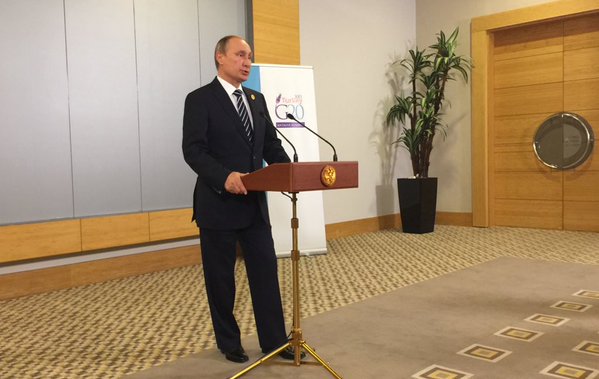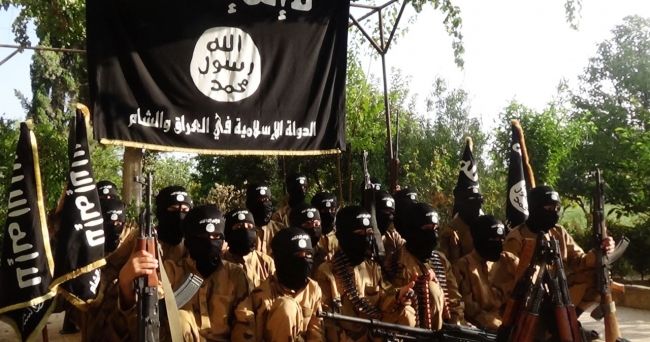"We're not going to wage
a war against Turkey. ... But we will seriously reconsider our agreements with
the Turkish government," Russian
Foreign Minister Sergei Lavrov said
in a press call on Wednesday,according to The Associated
Press.
"Our attitude to the
Turkish people hasn't changed," Lavrov continued. "We only have
questions about the Turkish leadership."
Turkey defended its decision
to down the plane on Tuesday, contending
that the plane was
in Turkish airspace and had been warned repeatedly before it was shot down by
Turkish F-16 jets. But Russian
President Vladimir Putin said
the plane was destroyed
by a Turkish missile while flying in Syrian airspace, roughly a mile from the
Turkish border.
By Wednesday morning, Russia had begun
bombarding rebels
— including Turkmen insurgents, who have ethnic ties to Turkey — in Syria's
Latakia province, ignoring demands
made by Turkey over
the past week to end its military operations close to the Turkish border.
Russia also announced
Wednesday that it would deploy state-of-the-art S-400 missile systems to the Russian
Hemeimeem air base near Latakia, Syria — 30 miles south of the Turkish border,
the AP reported.
The missiles, which are able to hit a plane with extreme accuracy, are
evidently meant to deter Turkish jets from shooting down Russian planes in the
future.
Russian tourists account for a huge
portion of Turkey's tourism industry — 3.3 million Russian tourists visited
Turkey in 2014, the second-largest number of tourist arrivals after Germany and
around 12% of total visitors, according to Reuters.
And in a largely symbolic gesture on
Wednesday, the Russian parliament proposed a five-year jail term for anyone
who denies that the mass killings of Armenians that began under Ottoman rule in
1915 constituted a "genocide," according to an article
translated by Foreign Policycolumnist and Russia commentator Julia Ioffe.
And there is one other way that Russia
could retaliate against Turkey more directly: Namely, by drawing attention to
the NATO ally's suspected ties to the Islamic State in Syria.
As The Soufan Group noted on Wednesday in
its daily briefing, Russia "is likely to use intelligence and
disinformation to highlight Turkey’s dealings with the Islamic
State."
Western officials have long harbored
suspicions about Turkey's links to the Islamic State, also known as ISIS, ISIL,
or Daesh. One official told The Guardian's Martin Chulov in July that aUS-led
raid on the compound housing ISIS' "chief financial officer" produced "undeniable" evidence that
Turkish officials directly dealt with ranking ISIS members — namely, by
purchasing oil from them.
Separately, experts, Kurds,
and even US Vice President Joe Biden have suggested in the past that Turkey has
helped enable ISIS by turning a blind eye to the vast smuggling networks of
weapons and fighters during the ongoing Syrian war.
For his part, Biden charged
that countries like Turkey,
Saudi Arabia, and the United Arab Emirates were so focused on ousting Syrian
President Bashar al-Assad that they did not properly vet the opposition groups
to which they sent money and weapons. (He
later apologized.)
Turkey joined the US-led anti-ISIS coalition in late July, after a suicide bomber with
links to the terrorist group killed 32 activists in the southeastern border
town of Suruc. Still, lingering suspicions remained about Turkey's commitment
to fighting ISIS, as it embarked on a dual campaign to wipe out a Kurdish
insurgency in its southeast.
Those suspicions were all but
put to rest last month when an ISIS-linked suicide bomber killed more than 150
people at a peace rally in Ankara — the deadliest terror attack in Turkey's
recent history.
But one day after Turkey downed its warplane, Russia has already begun to bring Turkey's
murky history with the group back into focus in order to discredit Ankara's
role in the anti-ISIS coalition — and legitimize its own.
"Turkey has demonstrated
that it is protecting ISIS," Russian Prime Minister Dmitry Medvedev said
Wednesday on Twitter,
adding that the damage from "Turkey's criminal actions ... will be hard to
repair."
Medvedev was seemingly echoing
a statement made by Russian President Vladimir Putin on Tuesday, when he
referred to Turkey as "accomplices of terrorists."
"We established a long
time ago that large quantities of oil and oil products from territory captured
by the Islamic State have been arriving on Turkish territory," Putin said
from theRussian Black Sea resort of Sochi before a meeting with Jordan's King
Abdullah.
Lavrov added on Wednesday
morning that
"terrorists" have been using Turkish territory to plot attacks on
other countries, the AP reported.
He claimed that the Russian warplane shot down by Turkey had been targeting the
extremists' oil infrastructure in Syria.
In any case, this war of words may be as far as Russia is
willing to go — for now.
"Putin's initial reaction
— calling the incident 'a stab in
the back by the
terrorists' accomplices' — is about as bellicose as could be imagined. But
Putin is no stranger to harsh rhetoric, and he has broader interests to play
for," geopolitical expert Ian Bremmer, president of Eurasia Group, told
Business Insider on Tuesday.
Bremmer noted, however, that
the "huge egos" of Turkish President Erdogan and Putin certainly
won't help future efforts to mend Turkish-Russian relations.
The Soufan Group largely
agreed.
"The most unfortunate
consequence will be that Russia will now roll back from its apparent
willingness to consider solutions for Syria that do not depend on Assad
remaining in power," the group said. "This is a key demand for
Turkey, and in the macho
world occupied by Erdogan and Putin, neither will want to appear to
have blinked first."

/cdn0.vox-cdn.com/uploads/chorus_image/image/47735403/GettyImages-489129346.0.0.jpg)
/cdn0.vox-cdn.com/uploads/chorus_asset/file/4295593/GettyImages-89234385.0.jpg)
/cdn0.vox-cdn.com/uploads/chorus_asset/file/3774824/GettyImages-473145446.0.jpg)
/cdn0.vox-cdn.com/uploads/chorus_asset/file/4295523/GettyImages-470152210.jpg)




